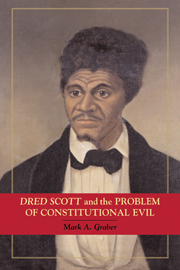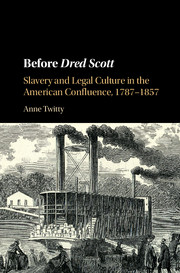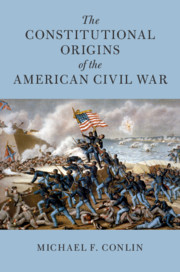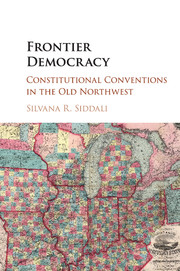Dred Scott and the Problem of Constitutional Evil
Dred Scott and the Problem of Constitutional Evil , first published in 2006, concerns what is entailed by pledging allegiance to a constitutional text and tradition saturated with concessions to evil. The Constitution of the United States was originally understood as an effort to mediate controversies between persons who disputed fundamental values, and did not offer a vision of the good society. In order to form a 'more perfect union' with slaveholders, late-eighteenth-century citizens fashioned a constitution that plainly compelled some injustices and was silent or ambiguous on other questions of fundamental right. This constitutional relationship could survive only as long as a bisectional consensus was required to resolve all constitutional questions not settled in 1787. Dred Scott challenges persons committed to human freedom to determine whether antislavery northerners should have provided more accommodations for slavery than were constitutionally strictly necessary or risked the enormous destruction of life and property that preceded Lincoln's new birth of freedom.
- New interpretation of antebellum constitutional law and politics
- Challenges conventional wisdom on purpose of constitutionalism
- Cutting edge law, political science, and history
Reviews & endorsements
"In this tough-minded and unstinting tour de force, Mark Graber uses the infamous Dred Scott case to highlight the difficult choices constitutional democracies face when people with radically different views must find ways to live together. By showing how plausible Dred Scott was in its own day, Graber offers a brilliant and sobering meditation on whether, in shaping our constitutional life, we should choose peace over justice."
Jack M. Balkin, Yale Law School
"To say that Professor Graber has written an important book is an understatement. No book published in recent years is more illuminating both about the practice of constitutional interpretation and the sometimes pernicious effects of the basic structures of American government established by the Constitution. Every scholar must read this book. More to the point, so should anyone who is concerned with the health of the American polity."
Sanford Levinson, University of Texas Law School
"Here is one of the most provocative books on constitutional law you will ever read, about history's most reviled case. Bucking the tide, Graber argues the Supreme Court actually got it right in Dred Scott. Constitutions, Graber explains, often are compromises with the devil. Once made, there are no tricks of constitutional law or interpretation that can make the evil go away."
Barry Friedman, New York University School of Law
"Constitutional 'evil' is an unsettling idea. It is a wrenching and embarrassing part of American constitutional history, but it is often painted with a light brush. In this fascinating book, Mark Graber has brilliantly compelled us to do much more. No longer can we ignore evil in our own experience. The emphasis on the Dred Scott case is a superb choice to highlight within the many other examples that are also considered. It provokes us to think about evil in its many forms -- from racial to institutional. It is a powerful solvent against the notion of American exceptionalism."
Thomas D. Morris, author of Southern Slavery and the Law, 1619-1860 and Cleveland-Marshall College of Law
"Mark Graber shows that, sadly, the Dred Scott decision's grim affirmation of slavery's constitutionality was an all too reasonable reading of American law. He then poses an even more painful question: whether the Civil War was the best route to eradicating that great constitutional evil. His sobering reflections will stimulate disagreements but also deeper understanding of monumental issues that are very much with us today."
Rogers M. Smith, University of Pennsylvania
"...one of the best and most fascinating works of constitutional theory to emerge in the past decade..."
The American Prospect , Scott Lemieux
"Dred Scott and the Problem of Constitutional Evil is the most interesting and original book on American constitutionalism that I have read in years."
Thomas M. Keck, Maxwell School of Citizenship and Public Affairs, Syracuse University, The Law and Politics Book Review
"this very important work recovers suprisingly significant elements of antebellum constitutional thought. It is relentlessly discomfiting and it forces one to recognize how strongly constitutional evil drove early American political development. It deserves a wide reading." - Richard M. Valelly, Swarthmore College
"This is a sharp and refreshingly realistic book about the limits of constitutional law." - Gerard N. Magliocca, Indiana University School of Law
"Graber offers an interesting, if controversial, approach to understanding constitutional history and the role of both the President and the Supreme Court in constitutional changes." -Council on National Literatures
Product details
August 2006Adobe eBook Reader
9780511223198
0 pages
0kg
This ISBN is for an eBook version which is distributed on our behalf by a third party.
Table of Contents
- Part I. The Lessons of Dred Scott:
- 1. The Dred Scott decision
- 2. Critiques of Dred Scott
- 3. Critiquing the critiques
- 4. Injustice and constitutional law
- Part II. The Constitutional Politics of Slavery:
- 5. The slavery compromises revisited
- 6. The compromises and constitutional development
- 7. The constitutional order modified:
- 1820–60
- 8. The constitution and the Civil War
- Part III. Compromising with Evil:
- 9. Majoritarianism and constitutional evil
- 10. Contract, consent, and constitutional evil
- 11. Constitutional relationships and constitutional evil
- Part IV. Voting for John Bell:
- 12. Lincoln v. Bell
- 13. Constitutional justice or constitutional peace.





